India's Third Giant Leap
This Could be One of the Biggest Opportunities for Investors
- Home
- Views On News
- Jan 8, 2022 - Top 4 ESG Stocks to Add to Your Watchlist
Top 4 ESG Stocks to Add to Your Watchlist
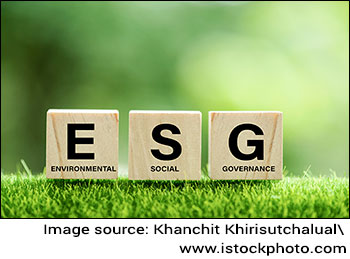
The Covid-19 crisis accelerated the trend for a more sustainable approach to investing.
Policymakers and investors viewed the crisis as a wake-up call as parallels were drawn between the unforeseen risks of a pandemic and issues such as climate change.
As a result, 2021 saw record-inflows into ESG funds and companies across the world.
What is ESG?
ESG is an acronym for Environmental, Social, and Governance. The term is used to describe a set of standards that evaluate a firm's collective conscientiousness for social and environmental factors.
ESG companies not only care about their profits and finances but also care about people and the environment, by focusing on sustainable development.
The ESG trend has already gained momentum in India, with companies choosing to act with greater social and environmental responsibility.
Here are five companies that are leading the way.
#1 Nestle India
The first ESG stock on our list is Nestle India.
The Indian FMCG giant works closely with farmers and local communities to raise the quality of life and economy of the regions it operates in.
The company has helped build facilities for drinking water and lavatories in the Moga factory milk district. It also provides loans to farmers.
Apart from this, it also focuses on sustainability.
From 2005 to 2020, for every ton of production, Nestle reduced the usage of energy by around 48%, water usage by around 52%, generation of wastewater by around 5%, and reduction in specific direct GHG (green-house gas) emissions by 53%.
Its key renewable energy projects contributed to GHG savings as well. This was implemented through the purchase of solar power at its Choladi factory and the use of green fuel for hot air generation.
Moreover, the company has set an ambitious target of recycling or reusing its entire packaging by 2025.
With respect to CSR (corporate social responsibility), Nestle India spent Rs 464 m in the financial year 2021.
Its CSR programs were carried out with a focus to raise nutrition, health, and wellness awareness among adolescents. It also implemented projects to develop community support for citizens.
During the pandemic, the company partnered with the National Association of Street Vendors of India (NASVI).
Through the partnership, it developed programmes to train street food vendors on food safety, hygiene, Covid-19 precautionary measures and digital payments.
In its latest quarterly results, Nestle reported a 9.6% YoY increase in revenue at Rs 38.6 bn on the back of value growth across categories. Net profit during the quarter rose 5.2% YoY to 6.2 bn.
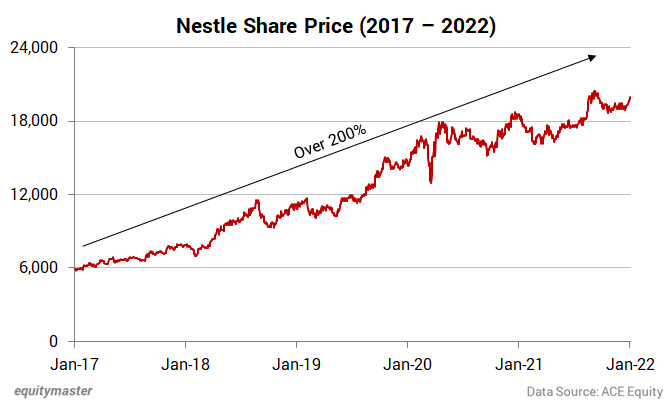
#2 P&G Hygiene & Healthcare
The next ESG stock on our list is P&G Hygiene.
The FMCG company also follows various socially responsible and environmentally sustainable practices.
Its manufacturing plant in Goa is a 'zero waste to landfill' site, which means that there is no manufacturing discharge into the environment.
The plant also leverages technology, experts, employees and renewable sources of energy to reduce its overall carbon footprint and improve energy and water efficiency.
As a result, in the last 10 years, it has reduced its carbon emissions by 90% and energy consumption by 30%.
P&G is also committed to help reduce the flow of plastic by making changes now and bringing long term solutions. It has put in place a system to recover and recycle multi-layered plastic packaging waste. It's also working with various waste management companies and the industry to collect, segregate and recycle multi-layered plastic packaging waste.
P&G has set up an 'Environmental Sustainability Fund,' to collaborate with external partners offering environmentally sustainable business solutions.
In the year 2021, P&G spent Rs 288 m on CSR activities. Its CSR strategy is supported by three pillars - P&G Shiksha, P&G Suraksha India and Timely Disaster Relief.
P&G Shiksha provides access to holistic education for underprivileged children while P&G Suraksha India provides comforts to those affected by natural disasters.
During the pandemic, the company extended support to communities through donations of in-house manufactured masks and sanitisers to combat the spread of the virus via its Covid-19 response and relief program.
In its latest quarterly results, P&G Hygiene reported a marginal increase in revenue at Rs 10.6 bn on account of a high base. Net profit fell 14% YoY to Rs 2.2 bn on account of commodity cost inflation.
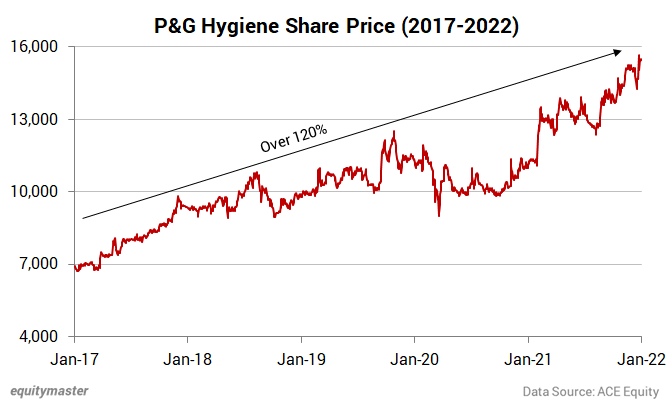
#3 Colgate-Palmolive India
The third ESG stock on our list is Colgate-Palmolive India.
The personal-care products company is engaged in a variety of social activities which are carried out through effective partnerships with reputed NGOs and agencies.
It has partnered with NGOs such as Seva Mandir and Water for People to provide access to drinking water in states like Maharashtra, Bihar, West Bengal, and Rajasthan.
In the education space, its scholarship program offers deserving candidates foundational support through scholarships and mentorship.
In the financial year 2021, Colgate-Palmolive spent Rs 210 m on CSR activities.
Besides this, water conservation remains a key priority for the company. The company's manufacturing plants and offices are focused on recycling and reusing water.
It also carries out sustainability and energy-saving initiatives across its manufacturing sites.
In August 2021, Colgate became the first mass-market brand to launch recyclable toothpaste tubes in India.
In partnership with EPL (formerly Essel Propack), the company has started manufacturing recyclable tubes for Colgate Vedshakti toothpaste and Colgate Active Salt portfolio.
The shift to recycling across the company's product portfolio will take time to fulfil keeping in mind the company's vendors and consumers. It will be completed by 2025.
Sub-brands are already in-line with taking the necessary steps to become sustainable. Eventually, the company aims to make the entire portfolio sustainable.
For the September 2021 quarter, Colgate reported a 46.8% YoY increase in revenue. The company's net profit also more than doubled during the quarter.
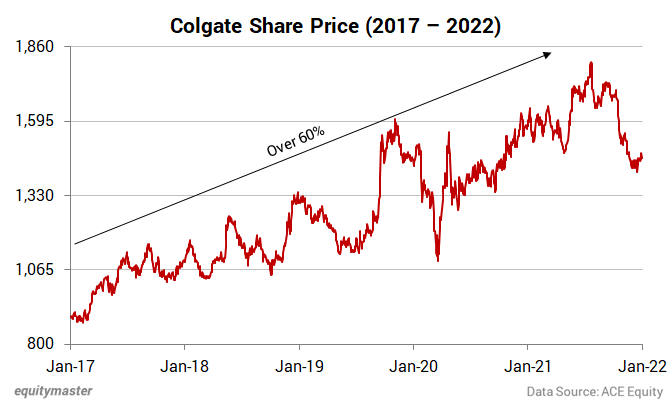
#4 Page Industries
The fourth ESG stock on our list is Page Industries.
The company is the exclusive licensee of the international innerwear brand JOCKEY in India and is a market leader in the innerwear category. It's also the exclusive licensee of the Speedo brand in India.
Page Industries has tried to adopt a sustainability culture in all aspects of its business.
Some of its initiatives include having a Restricted Substances List (RSL) policy, access to safe water, sanitation and hygiene and 100% recycling of its packaging as well as production waste.
The company also takes water and energy conservation steps along the value chain. In the financial year 2021, Page Industries spent Rs 62.6 m on CSR activities.
The company partnered with NGOs to help in the upliftment of underprivileged communities in the field of education and healthcare.
Through its Sugamya Shiksha program, the company provided quality education and vocational skills in government schools in and around the areas it operates in.
Educational support and career guidance were provided as well.
The company's Chirayu program provided health education, awareness and support to children with medical issues while Jockey Fit Children (JFC) enhanced the health and physical fitness of children.
During the pandemic, Page Industries sponsored medicines, oxygen concentrators and over 100,000 masks to government hospitals and government authorities.
Awareness on Covid-19 and Do's and Don'ts for Covid-related safety was imparted and face masks were distributed to the public for free.
In its latest quarterly results, Page Industries reported a 46.4% YoY increase in revenue as sales across all product categories grew backed by expansion in the company's portfolio and existing network.
Net profit rose by 44.8% YoY.
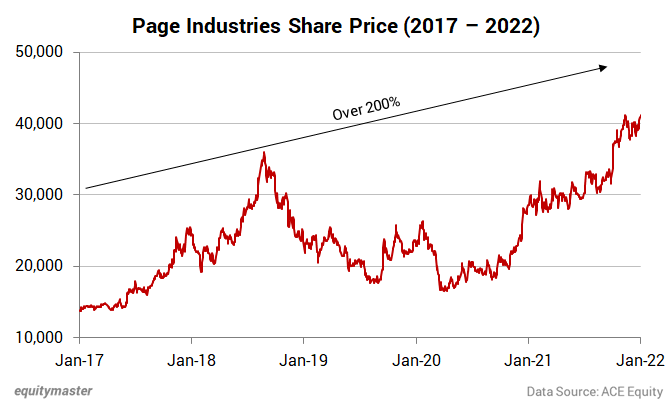
Snapshot of ESG stocks from Equitymaster's stock screener
Here's a quick view at the above-mentioned companies based on some crucial financial parameters.
Please note that these parameters can be changed according to your selection criteria.
Why you should invest in ESG stocks
Studies have shown that companies that rank higher on the ESG scale experience a lower cost of capital compared to other companies with lower scores.
They are also able to mitigate external issues and consequently reduce business risk. This means better profits and therefore better returns for investors.
While the above-mentioned reasons are compelling, one must view ESG stocks with the same amount of caution as one would view other stocks.
ESG stocks can be prone to greenwashing and a lack of globally accepted standards for ESG metrics is a problem as well.
Note that the above stock profiles have mentioned only the various social and environmental initiatives carried out by these companies.
However, one must look at governance as well. Good corporate governance helps to build an environment of trust, transparency and accountability.
These are important factors for fostering long-term investment.
If you plan to invest in an ESG stock, assess the fundamentals and prospects of the business. Sustained research must not be compromised despite the positive odds.
Disclaimer: This article is for information purposes only. It is not a stock recommendation and should not be treated as such. Learn more about our recommendation services here...

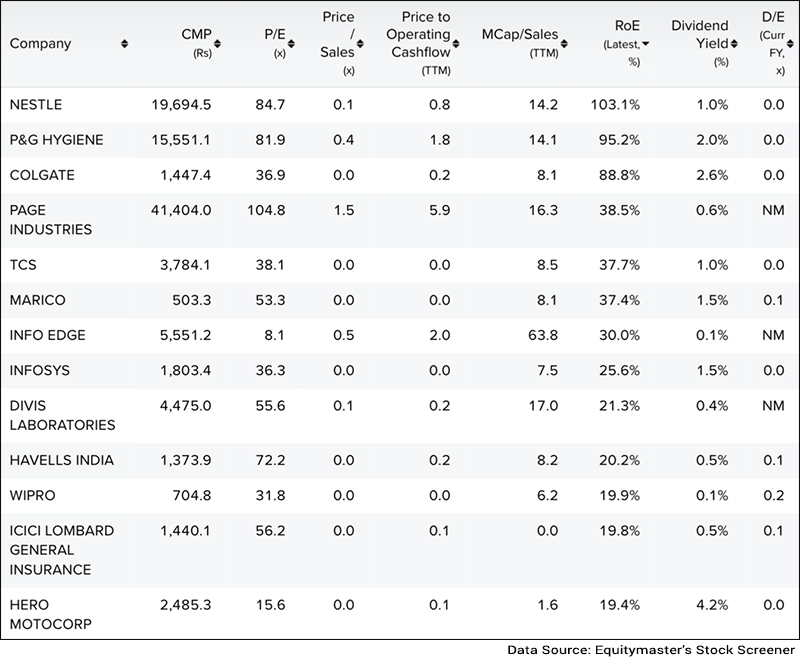

Equitymaster requests your view! Post a comment on "Top 4 ESG Stocks to Add to Your Watchlist". Click here!
Comments are moderated by Equitymaster, in accordance with the Terms of Use, and may not appear
on this article until they have been reviewed and deemed appropriate for posting.
In the meantime, you may want to share this article with your friends!